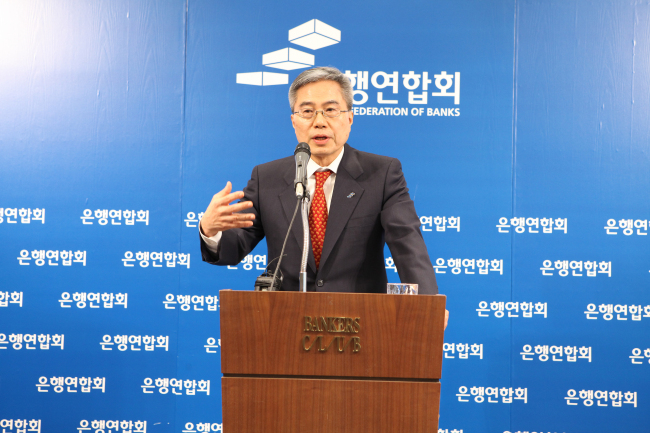The head of South Korea’s federation of banks urged financial authorities to allow banks to offer broader money trust and asset management services, in a tit-for-tat move against the chief of the financial investment association representing brokerages and asset management firms.
Ha Yung-ku, chairman of the Korea Federation of Banks, said the current law banning banks from offering unspecified money trusts is unfair, given that the regulator recently allowed large-sized brokerages to enter the corporate lending by launching investment management accounts.
An unspecified money trust refers to a financial product in which the investor does not designate a specific method for management of the money.
“Since IMA is almost no different from an unspecified money trust, it is unfair to ban it only in the banking industry,” Ha said in a press conference in Seoul.
“Trusts can be offered universally in the financial industry, regardless of a specific sector.”
 |
Ha Yung-ku, chairman of the Korea Federation of Banks, speaks at a press conference in Seoul, Monday. (KFB) |
Ha’s view starkly contrasts with that of Hwang Young-key, chairman of the Korea Financial Investment Association, who said banks should not try to enter the asset management industry, which was the brokerages’ own turf.
Ha is also opposed to Hwang’s plan to persuade the government to allow securities firms to offer corporate payment and settlement services. Hwang had told reporters last month that a company should be able to use not only its bank account, but also its brokerage account to receive payment after selling products to a client.
“Around the world, there is almost no country that allows securities firms to offer such services. Even if they do, their competitiveness will not improve much,” Ha said.
To spur growth of internet-only banks, Ha also urged lawmakers to pass a bill to ease regulation that prevents a conglomerate from owning more than 10 percent stake in a bank. If voting rights are involved, the maximum is 4 percent.
Revision bills to increase the ratio to 34 percent or 50 percent are pending at the National Assembly, with opponents worried that chaebol might use banks for their private coffers.
“Such worries can be resolved through various ways, such as preventing the largest stakeholder from taking a loan from the bank or strictly specifying the eligibility of the largest stakeholder,” Ha said.
By Kim Yoon-mi (
yoonmi@heraldcorp.com)








![[Today’s K-pop] Blackpink’s Jennie, Lisa invited to Coachella as solo acts](http://res.heraldm.com/phpwas/restmb_idxmake.php?idx=644&simg=/content/image/2024/11/21/20241121050099_0.jpg)